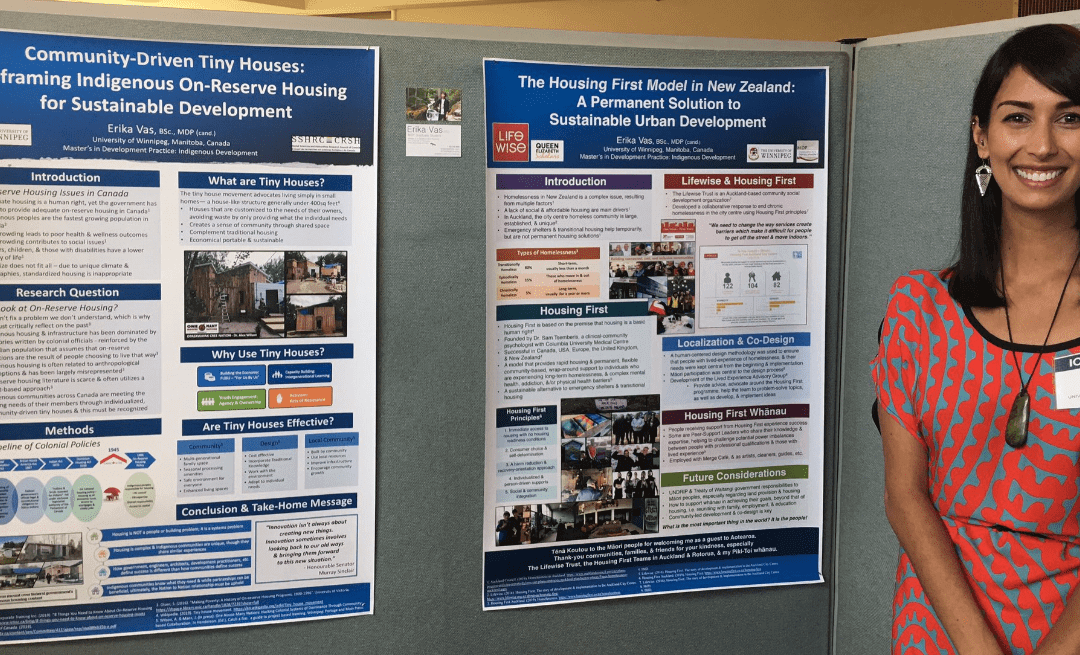Publish Date:
25 September 2019Keywords:

25 September 2019
“When did it become acceptable for people to not have houses?” the Master’s in Development Practice student asked.
It’s not a rhetorical question.
Her belief is that it starts with the ‘othering’ of people and colonisation. Statistics back Erika’s theory. Across the world a disproportionate percentage of Indigenous people experience homelessness.
In Auckland more than half of rough sleepers are Māori with the situation similar for First Nations people in Winnipeg, Canada.
However, Erika who counts Linda Tuhiwai Smith (Ngāti Awa, Ngāti Porou) and her seminal text Decolonizing Methodologies: Research and Indigenous Peoples as major influences sees Indigenous-led solutions as the answer to the housing crisis.
“Any development whether it is installing a park bench or going to Africa to build wells, if that is what the community needs, I can’t see doing it any other way than from an Indigenous perspective,” Erika said.
“For far too long it’s been economists coming in and telling us how to do things. It should be about relevance, respect, reciprocity and looking for an Indigenous perspective. When I say that I am looking to the people that were there first – the mana whenua, who hold centuries of knowledge.”
Indigenous to Goa, Erika was raised in Lethbridge, Alberta the traditional territories of the Blackfoot and people of the Treaty 7 region in southern Alberta. She lived next to the 1363 km2 Kaniai Nation (Blood Tribe) reserve, where she has both worked and socialised.
“I have personal experience of colonisation and being part of a marginalised group. I am a person of colour, but white passing, so I understand first-hand how complicated colonisation can be,” Erika said.
Growing-up her psychotherapist father and Justice of the Peace mother “talked about things and had a worldly lens”.
“From a young age we were made aware of our privilege and responsibilities. As immigrants we had the empathy and understanding that life is hard,” she said.
Erika’s journey into social justice was a natural one. From championing Jump Rope for Heart at primary school she joined Amnesty International at the age of 18.
“Amnesty started my fire. I realised what I care about is human rights and I met like-minded people. See this badge I am wearing. It is for the missing and murdered Indigenous women and girls in Canada. This is happening now,” Erika said.
“This is happening all over the world. In New Zealand there is Indigenous homelessness, discrimination, mental health issues. Housing is a human right and should be provided by the government.
“Why does this matter? I look locally. We have third world conditions. In God’s Lake – four Indigenous youths died from suicide and 22 attempted it last summer. They need hope.
“If people are completely battered down by systems. Treated poorly. Disproportionally represented in bad statistics. How do they thrive? The drinking water is not clean. The infrastructure is not there. There is a history of trauma and history of colonisation.
“That’s hopelessness. How can you dream if you don’t have a home?”
However, Erika does not lack in hope or optimism in both Canada and New Zealand’s ability to tackle these complex intergenerational issues.
Deciding whether to come to New Zealand or Australia for the international field practice component of her master’s program Erika’s supervisor, Jino Distasio was quick to recommend New Zealand. He connected Erika with the Housing First Auckland team resulting in her being offered a placement at Lifewise where she spent time working in Auckland and Rotorua.
When arriving in New Zealand Erika wrote down a quote that she now refers to often:
‘The Kawanatanga (crown) must provide services for Māori people.’
“Housing First principles are pretty universal – community, friends, no ‘one’ right way, but the localisation has been so beautiful to see in Aotearoa – the co-design with Māori and kaupapa Māori approach,” Erika said.
“In Winnipeg we want to support First Nation’s people to develop their land for the people by the people. So, I was very optimistic to see the housing development work by iwi in Aotearoa. How Housing First is being done with people at the centre and Indigenous people leading the way.”
“I saw in Rotorua the possibility with Housing First, Iwi, Lifewise and LinkPeople. The programme has a distinct Māori kaupapa – a connection with language, culture, whenua and a developing sense of whānau within Housing First,” Erika said.